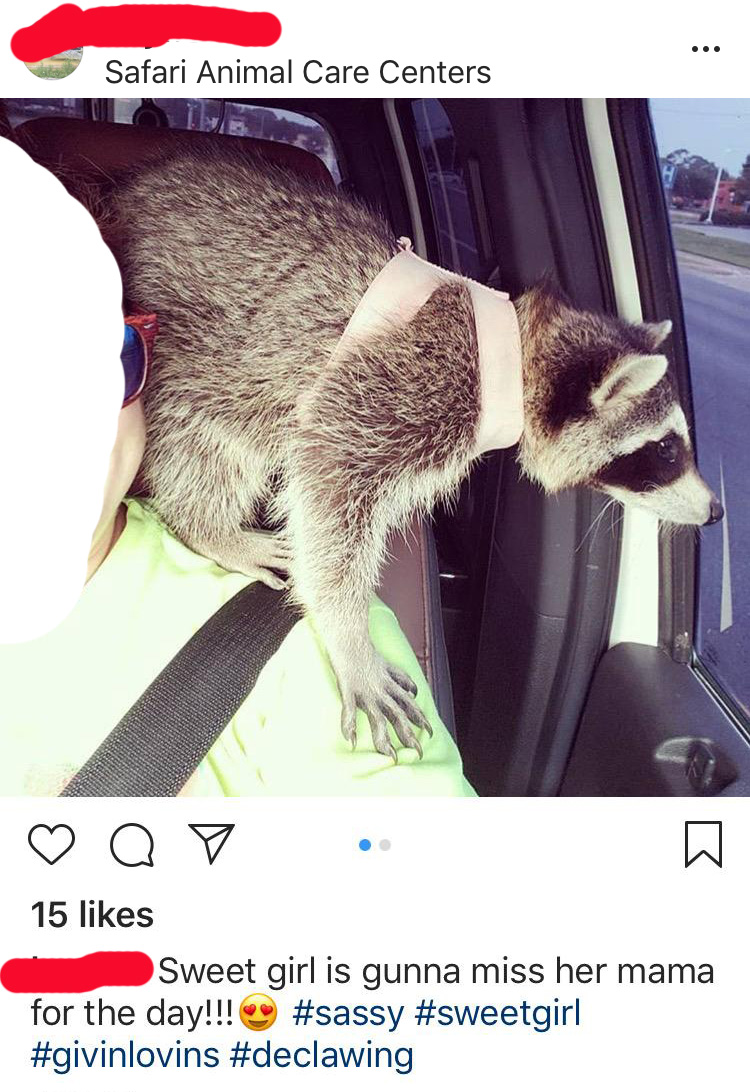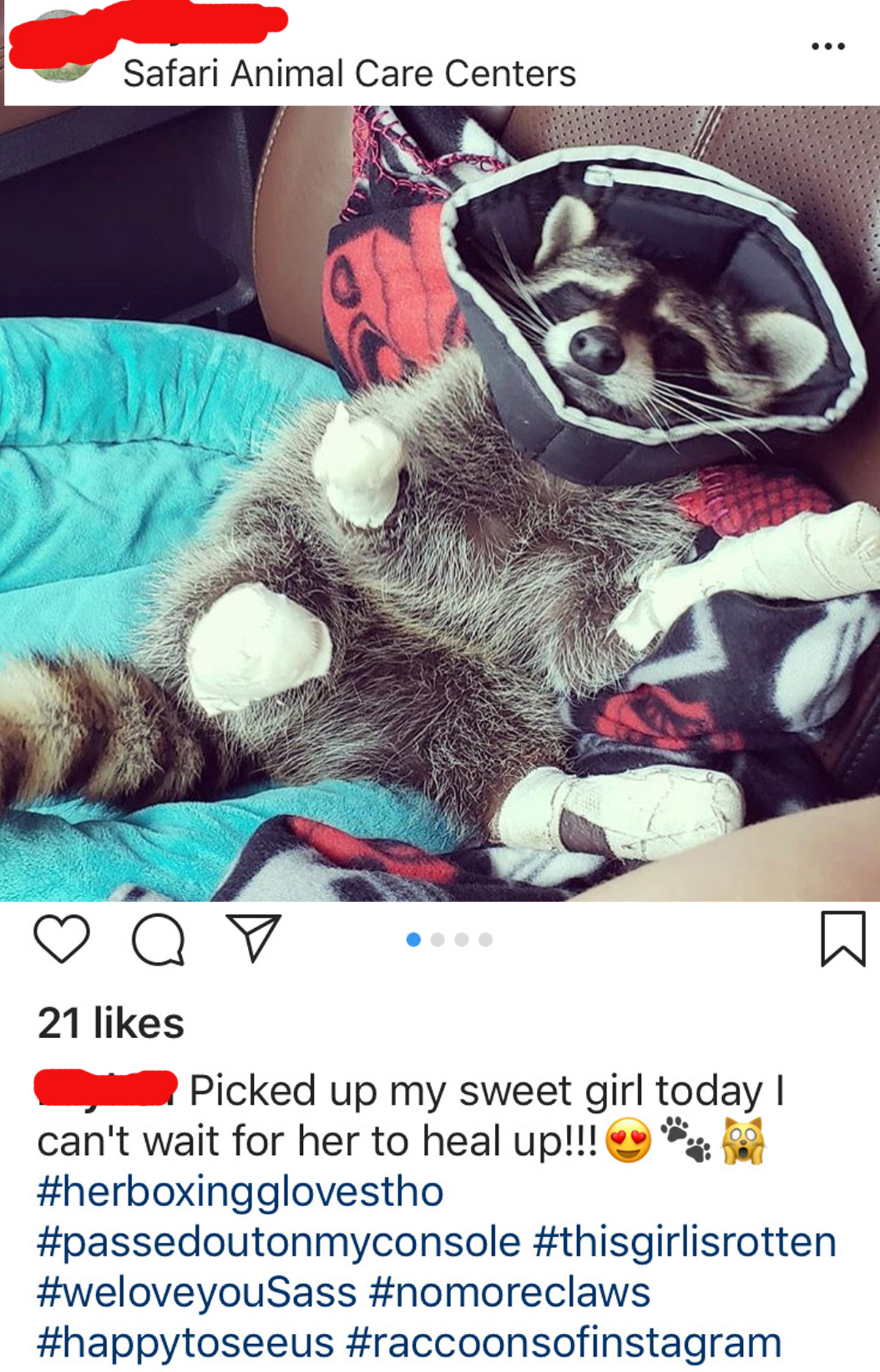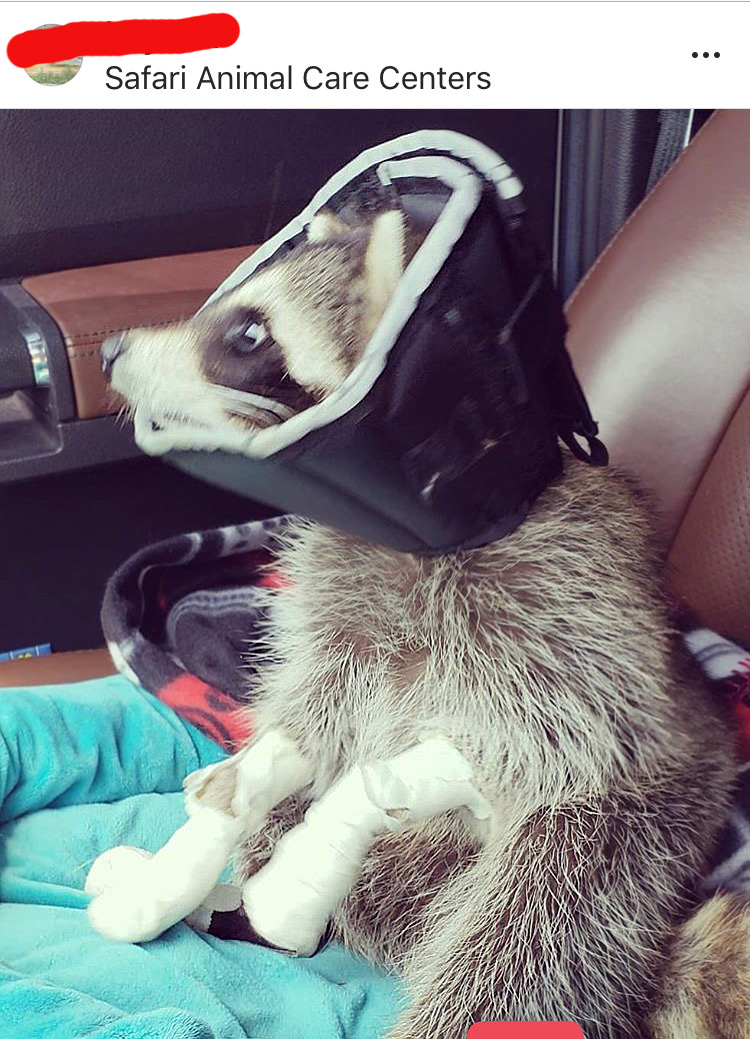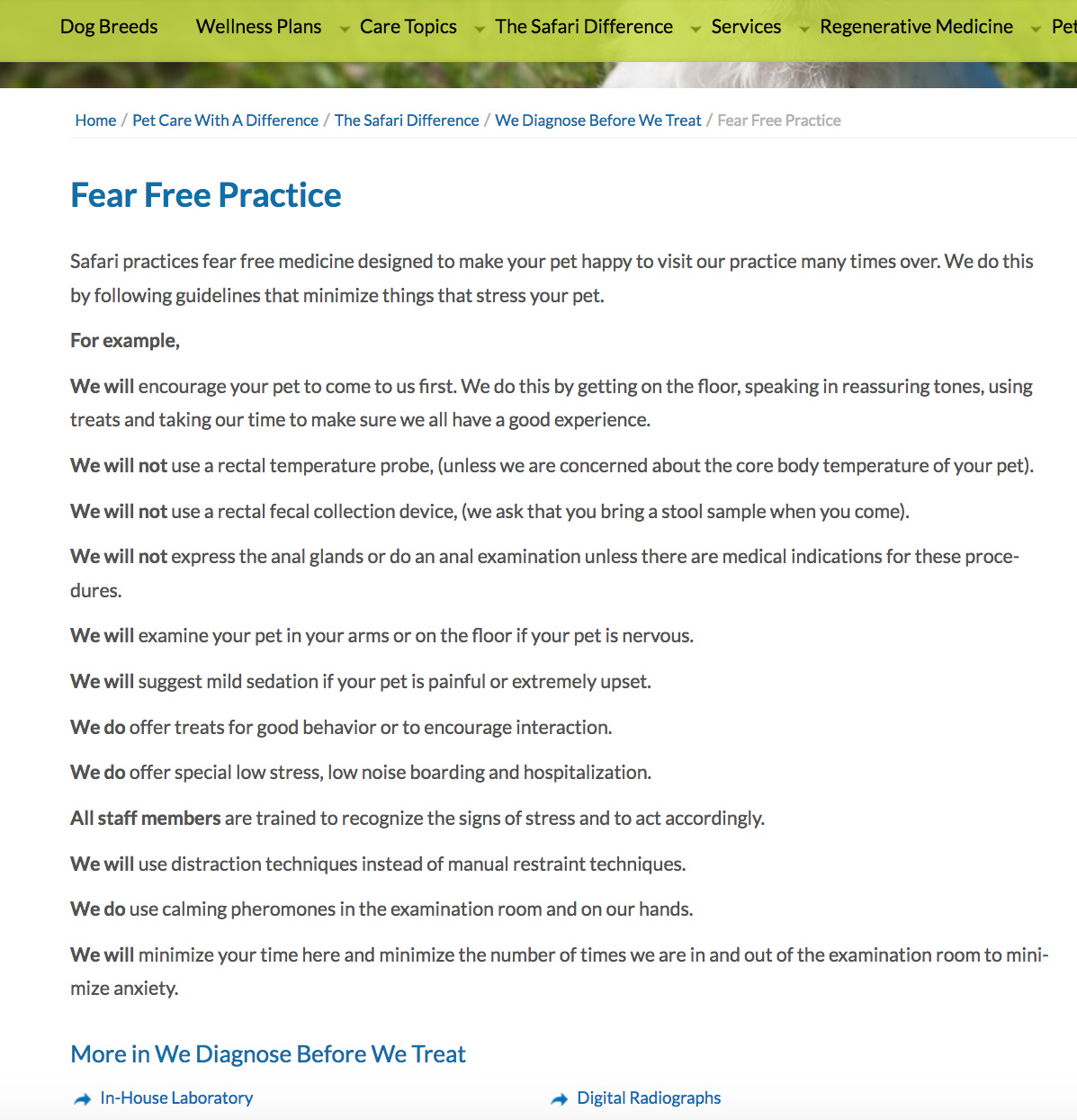August 14, 2018
These are photos of a declawed raccoon that were posted on Instagram on July 26, 2018. The location was tagged “Safari Animal Care Centers” in League, Texas.
The purpose of this story is to educate the public about why they shouldn’t own a pet raccoon and also why they shouldn’t declaw them.
Here’s another photo on Instagram that was posted by the raccoon owner.
The founder and chief of staff of this veterinary practice, Safari Animal Care Centers, is Dr Steven Dale Garner. He’s a 37 year member of the AVMA.
According to his staff, he declaws many cats and many raccoons at Safari Animal Care Center. He is the only Board Certified Veterinarian in Galveston County, Texas. He is an accomplished leader in the veterinary profession. Dr. Garner also has been recognized as a member of the AAHA Standards Enhancement Task Force.
More about his accomplishments here. [button href=”https://www.veterinarians.com/profile/safari-veterinary-care-centers-league-city-texas.html” color=”red” newwindow=”yes”] Dr Steven Garner’s accomplishments[/button]
Just to confirm that Safari Animal Care Center declaws raccoons, we placed a few calls inquiring about it.
When a person called Safari Animal Care Center to inquire about declawing a raccoon, the employee said they can do that and said they actually did a declaw on a raccoon the day before. The person asked if it’s ok to declaw a raccoon and the employee said, “With everything, some people might not agree, but if you want to home one and make it your baby, it’s ok.”
According to the employee, their raccoon declaw prices are as follows: $405 for the front paws and $600 for an all four paw declaw. They said the doctor uses a laser and that it is less pain and less bleeding.
Another employee, when asked about getting a raccoon declawed and if their vet is skilled at the procedure, said that they do 2-3 raccoon declaws a week.
A vet tech, who said that they assist Dr Garner with the raccoon declaws, was put on the phone to explain some questions the caller had. The vet tech was asked if it is true that they do 2-3 raccoon declaws a week and the vet tech laughed and said that they do “quite a few.”
The vet tech said that some people think it’s like declawing a cat but that it’s not and said it’s like a removing a nail from a human finger that has soft padding under the nail.
The caller said that they were confused because they saw online photos of a skeleton of a raccoon paw and it looked like the claw was attached to the bone. The vet tech went online while the phone call was taking place and was adamant that raccoon claws are not attached to bone and said that they must have glued them to the skeleton in the photo.
The caller asked if it was harmful to declaw a raccoon and the vet tech said it’s not something they highly recommend but a lot of people who have them as pets don’t want to get “torn up.”
Another phone call was made to try to get an answer about the raccoon claw being attached to the bone from Dr Garner, but he wasn’t in the office. The employee asked Dr Garner’s wife, who is also a vet but doesn’t practice at Safari, and she conveyed this information to the employee to tell the caller. She said that they have to get in to get the root of the claw and that a little bit of the bone might be removed.
We have withheld the names of employees for fear that they might suffer a backlash for their honest answers.
More facts about raccoons. [button href=”https://kids.kiddle.co/Raccoon” newwindow=”yes”] Raccoon facts[/button]
A check in the area of veterinary practices that treat exotic pets revealed that none of them will perform a declaw on a raccoon.
A vet at Gulf Coast Veterinary Specialists in Houston said that it’s not recommended to have raccoons as pets or to declaw them because it’s not humane and they don’t have retractable claws so it’s like cutting off the tips of their fingers. When asked if they declaw cats there, the doctor said they only perform tendonectomies on cats.
Another hospital that treats exotics, Westgate Pet and Bird Hospital (AAHA hospital) in Austin said that raccoons don’t have retractable claws so declawing them is taking out their whole nail bed and it would be like they were walking on “nubs.” They declaw cats and ask if you want all four or two paws when a researcher called to check on their declaw fees.
Animal Kingdom Pet Hospital in League City said that raccoons are wildlife and they don’t declaw them. They declaw cats.
Natural History Museum of Los Angeles County
I reached out to the Natural History Museum of Los Angeles County to get some facts about declawing a raccoon and here is their response.
1) Keeping raccoons as pets is a horrible idea, and 2. Removing the claws of a raccoon is an equally horrible idea.
The claws of raccoons are permanently exposed (as in dogs and many other mammals), which is completely different from the situation in cats, where the claws are retractile. The claws are attached to and cover the very last bone of the fingers and toes (called the distal phalanx).. Removing the claw involves removing the bone—so it’s not just de-clawing the animal, it’s de-boning the animal.
The same is true for cats, but that last bone in cats is smaller and more slender than it is in a raccoon. It is not a trivial thing to remove those claws and bones in cats, and it’s certainly a pretty big deal to do it to a raccoon. Painful, yes. Potential for nerve damage, yes.
And if the raccoon is ever released back into the wild (for example, if the owner later decides it was a bad idea to have a pet raccoon), that released animal would be at a supreme disadvantage in the wild (they have claws for many reasons, including protection, foraging, etc.).
Jim Dines, Ph.D. Mammalogy Section, Natural History Museum of Los Angeles County
Here’s a photo of the same raccoon after the 4 paw laser declaw with possible signs of damage to the paw pads from burning off the raccoon’s toe bones and claws. 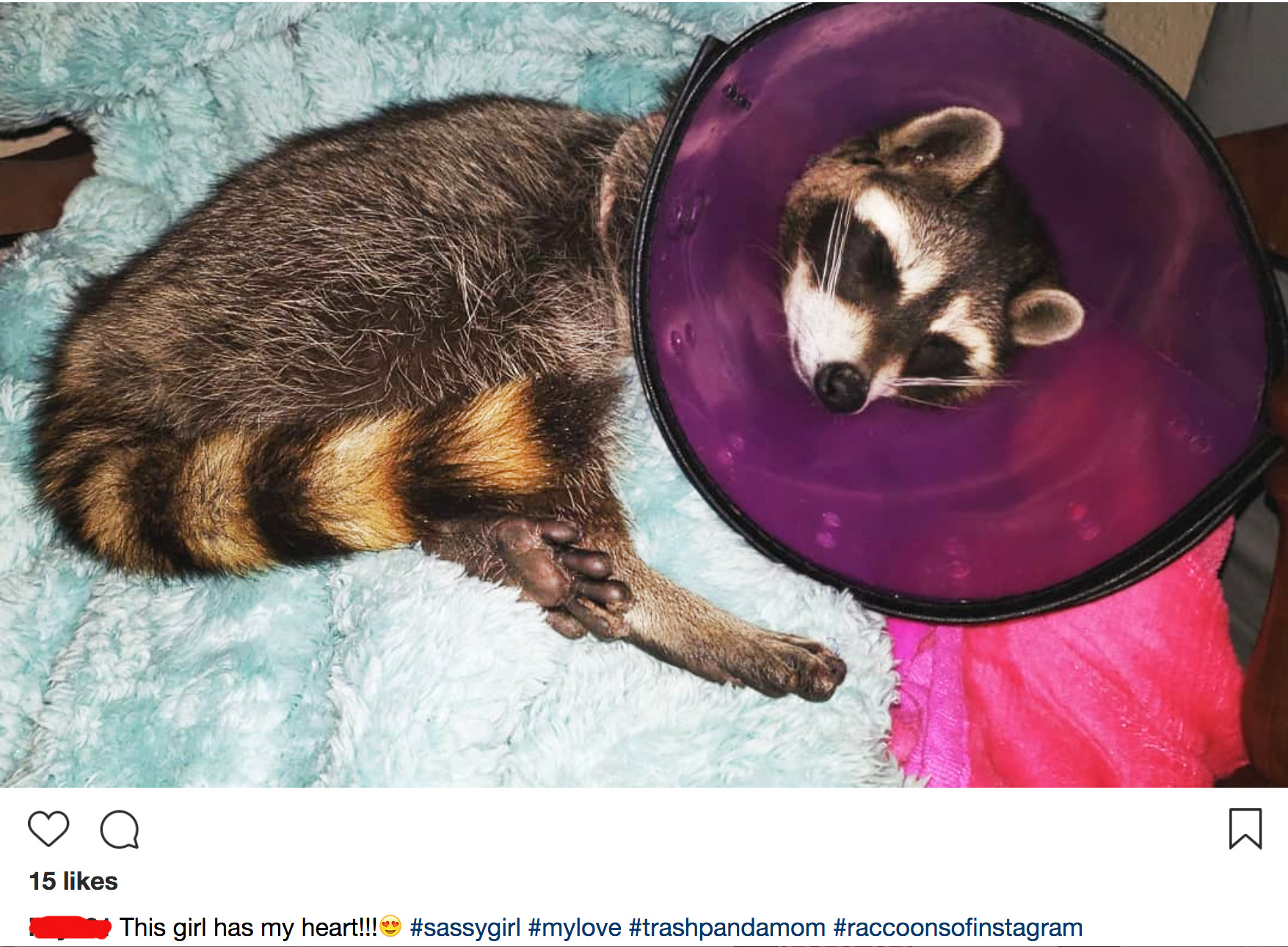 Close up of the declawed back paws.
Close up of the declawed back paws.
Dr Garner also declaws cats, he uses a CO2 laser and an employee at Safari Animal Care Center said that they do cat declaws regularly. When a caller asks for the price of a declaw they ask, “Front or all four?”
The employee said that a front declaw is $500 and that they think an all four paw declaw is around $900. When asked who is best at the declaws, employee said Dr Garner is the one who does their declaws and that he is the only Board Certified vet in Galveston County. The employee said that they use the same anesthesia that Texas Children’s Hospital uses. Employee also said that Dr Garner recently declawed their cat and it’s all healed up after two weeks.
We reached out to Dr Garner to see if we could get some facts about declawing a raccoon from this expert and his take of this story. Here is the email correspondence.
Lori
His response,
August 13, 2018
Lori,
Just to be clear, I do not recommend the ownership of Raccoons. In Texas I believe it is considered illegal to own such wildlife. My veterinary position is that if people are going to own these pets against our recommendations – then and only then – will we provide veterinary care. They need someone who understands their nutrition and physical needs. When a raccoon has been taken from the wild and reared in the home, it is difficult for them to return to the wild – ever. This is because they have not developed the wild instincts to forage for their food and to be warily of their enemies. Raccoons in captivity are always a problem however as they become aggressive (as interpreted by humans) and this aggression is difficult for most humans to manage.
Declawing is not recommended as it permanently changes a raccoons behavior.
Declawing cats was once common but is now frowned on and illegal in most other countries and some states. If declawing is done it should be done to minimize pain, trauma, and to prevent the claws from growing back. Surgical laser is one way to accomplish this. Declawing a raccoon is no different except a raccoon is not a domestic animal.
Please leave the wildlife wild.
Best Regards,
Dr. Garner
∧__∧
ミ^♀^彡
⌒ ⌒
Steven D. Garner DVM, DABVP
American Board of Veterinary Practitioners
Chief of Staff: Safari Animal Care Centers
Safari Knowledge Systems, LLC
Dr Garner,
Lori
August 13, 2018
Lori,
Dr. Garner
August 14
Actually I didn’t know a thing about declawing raccoons and was trying to get the facts from an expert who performs that amputation procedure on them.
Lori
August 17
Lori,
Dr. Garner
Lori
August 20
Ms. Shepler,
My clients, friends and staff call me Dr. Garner or DOC. Steve is reserved for my family.
I grew up in the rural Arkansas Ozarks during the 50’s and 60’s where wildlife ownership was common, and we watched Elly Mae Clampett on TV “The Beverly Hillbillies” loving on her 6-pound young juvenile raccoon. On the other hand, Fall and Winter weekends in rural Arkansas; it was not uncommon to go Raccoon Hunting where you could witness a 25 pound fully adult raccoon ravage a whole pack of larger dogs. Today, 50 or 60 years later most people see raccoons as either “Road-kill” or as vermin raiding their garbage. Here in Texas it is perfectly legal to trap or in other ways kill a “vermin” raccoon on your property. The raccoon population has exploded as they have migrated from the woodlands to the back alleys and yards of urban America in search of food. The Springtime brings many many cute, cuddly baby raccoons into contact with the public. Raccoons have become one of the most important reservoirs and vectors of Rabies as they, unlike dogs or cats, can carry the virus without showing clinical outward signs and they go unvaccinated.
Wildlife rehabilitation specialists are licensed by the State of Texas to care for these babies and to return them to the wild. Which they do by the truckload every year, in every location around Houston. We help with this process when veterinary care is needed. Most ill or injured are euthanized. This year however we had one licensed rehabilitator bring us a young raccoon baby being bottle fed that had a cut around its mid-line so severe it required several surgeries to repair. By the time this raccoon had recovered he was a youngster too late to rehome to the woodlands. The “owner” had it in her home and had fallen in love with it and its siblings. They were in turn given to her sisters and or cousins and it is this family of raccoons that were declawed. I am not sure of the family ties or details, but the families also had babies, toddlers and or young children. I am sure my staff was asking your “spy” if they were a licensed rehab specialist when they called with a raccoon question. They were not requiring a license for ownership of a raccoon treated by us.
Animal Control officers are employed by cities and counties in Texas to control animals – in the case of raccoons, “control” means kill. Even though the rabies vaccine works in raccoons, there is no legal definition of a vaccinated raccoon. So, a vaccinated raccoon (unlike a vaccinated dog, cat or ferret) that bites or even scratches a human is killed. There is no quarantine or consideration for people who have been caring for these animals.
If a raccoon is kept in a home in Texas it is illegal and will be confiscated and euthanized immediately. This is what has now happened to the raccoon that you posted on your website. Because of your publicity, the Animal Control has controlled this animal. If a child is scratched the raccoon is killed. The purpose of declawing raccoons which cannot be returned to the woodlands is to prevent scratches that if reported could result in the raccoon’s death. Our recommendations to all people who own exotic animals from exotic cats, to wolf hybrids, to monkeys, to wildlife is to vaccinate the animals and to not publicize the ownership of them. So many times, the result of bragging or showing off their pet, is death of their pet. As stated before, I do not condone the ownership of these animals or am I obligated to turn in my clients to the officials. I am obligated, however, to the care of these animals and to the prevention of their death.
This one family represents all the raccoon declaws that I have done recently or in the past several years for that matter. The staff members you have spoken to are new to our staff and made unwise assumptions about how many raccoons we declaw. They see a lot of weird animals and are told to act as if it not their first time to see a sloth or alligator for example. I am not in the habit of lying and do not appreciate these accusations.
Laser is CO2 molecules hyperexcited and tuned to create a photon frequency that causes water to vaporize. Cells are largely bags of water, so when their contents are vaporized it causes the cell to be disrupted by steam. This is not burning, does not cause the same pain, but does allow accurate dissection not allowed by scalpel or electrosurgery. The nerves are sealed by the process and blood vessel collagen is constricted so there is no bleeding and visualization is easier. This is important. Think of your nails, they grow from bone, but it is your finger tips that are important. Removal of the claws in a manner that is humane and so they will not grow back is done by laser so that the claw and the bit of bone that it grows from is removed while leaving the important finger tips or pads of the toes present. This can be done with laser. Look at the photos you posted. The fingertips are still there and only the claws are gone. This is not mutilation – it is done with laser under magnification to preserve the feeling and function of the toes. The heavy bandages are to prevent the raccoon from doing self-trauma before the wounds are healed.
Raccoons are now a part of our urban environment – here to stay – they are not just the woodland creatures of the past. Their mental capacity was measured and reported in last month’s Scientific American as being smarter than cats and even dogs in some manners. They adapt well to the home and live twice as long in captivity than in the wild. They change to an adult at 3 years of age and become aggressive and potentially dangerous, but not more than a rottweiler or pit bull. Do you ever think how cats and dogs were first domesticated? Do you ever think how you would feel if one day a knock at the door resulted in your loved pet cat being removed and killed by animal control? Think about these things next time before you pass judgement on someone who may be more on your side than you realize.
Dr. Garner
August 20,
You didn’t answer a lot of my questions in my email.
Also why would you do a two paw declaw on one raccoon last week and a 4 paw declaw on Sassy?
I’m not passing judgement on anyone. I’m writing stories with the facts in them.
Lori
Dr. Garner
August 20
You said that Sassy was euthanized. Is this a fact Mr Garner?
So the 10 raccoon declaws you’ve done in 35 years are all from the same family? Okie dokie. Very interesting to say the least.
You’re big worded description of how your $35,000 laser works is a clever way to try to throw up a smokescreen and mask the fact that you are barbarically and unnecessarily burning off much needed toe bones and claws on cats and raccoons.
More Information About Dr Garner from his website.
From Safarivet.com [button href=”http://www.safarivet.com/pet-care-with-a-difference/the-safari-standards/” newwindow=”yes”] Safarivet.com[/button]
“Ethical Standards For Safari
The Safari Code of Ethics sets the stage for how we “Ought” to behave. They provide a frame of reference for decision making as we care for your loved ones. This Standard includes many Ideals that we strive to achieve in our personal and professional life. Including, “Do No Harm”, “Respect All Life” , “Always Do What Is Best For The Pet”, and many others.”
Another motto they use is, “We Never Say No.” [button href=”http://www.safarivet.com/pet-care-with-a-difference/the-safari-difference/we-never-say-no/” newwindow=”yes”] Safarivet.com “We Never Say No”[/button]
I received a heads up that you are now requiring raccoon owners to bring in proof of a license to own a raccoon before they can get their pet raccoon declawed or before you treat it.
Dr Garner, touts all his accomplishments on his website. [button href=”http://www.safarivet.com/pet-care-with-a-difference/the-safari-difference/history-of-safari/” color=”red” newwindow=”yes”] The history of Safari[/button] 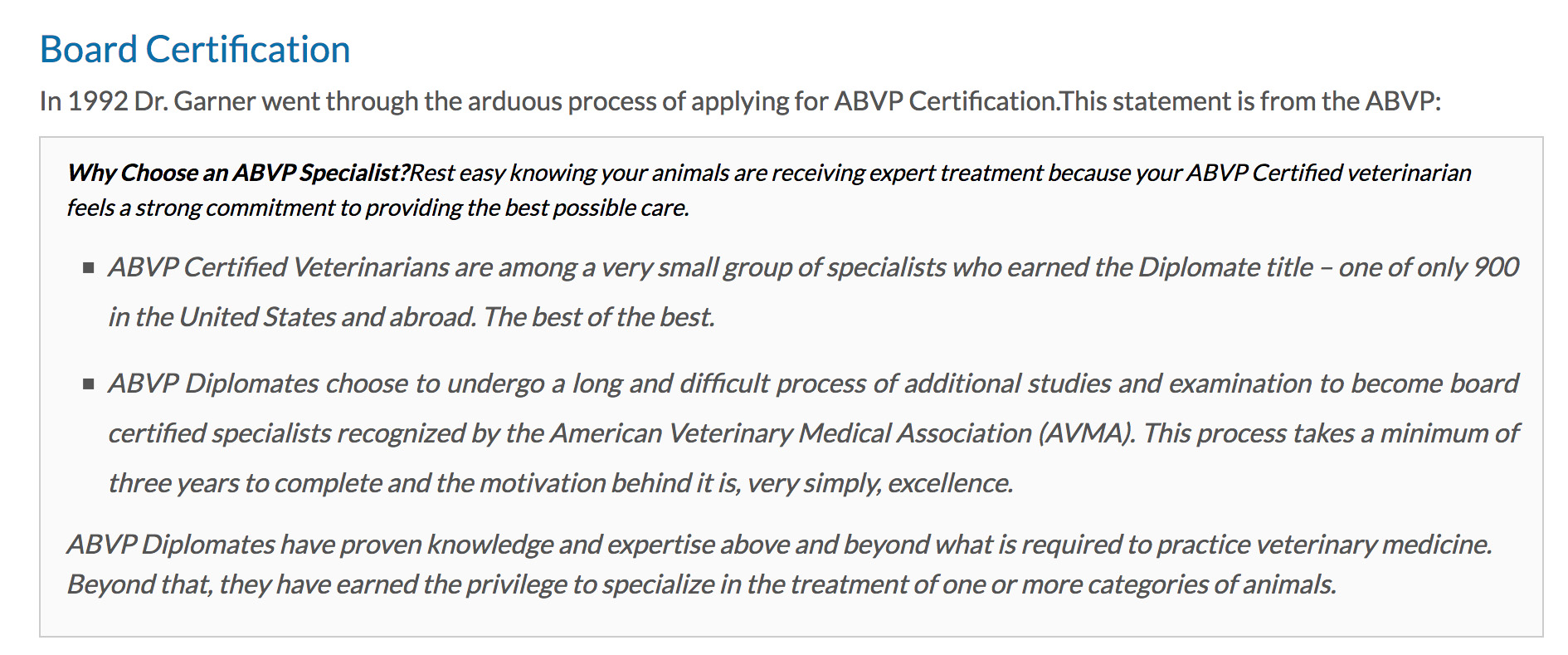 Some of the info on the American Board of Veterinary Practitioners website says this, “ABVP Certification sets you apart – among the most ambitious, forward-thinking professionals in veterinary care, driven by a commitment to the wellbeing of animal and those who care for them.The ABVP board certified veterinarian has demonstrated they are capable of providing a level of clinical practice that is clearly superior to the norm of the profession. ”
Some of the info on the American Board of Veterinary Practitioners website says this, “ABVP Certification sets you apart – among the most ambitious, forward-thinking professionals in veterinary care, driven by a commitment to the wellbeing of animal and those who care for them.The ABVP board certified veterinarian has demonstrated they are capable of providing a level of clinical practice that is clearly superior to the norm of the profession. ”
Link to the ABVP page [button href=”https://abvp.com/veterinary-certification/” color=”red” newwindow=”yes”] ABVP website[/button]
Here’s another screenshot from Safarivet.com.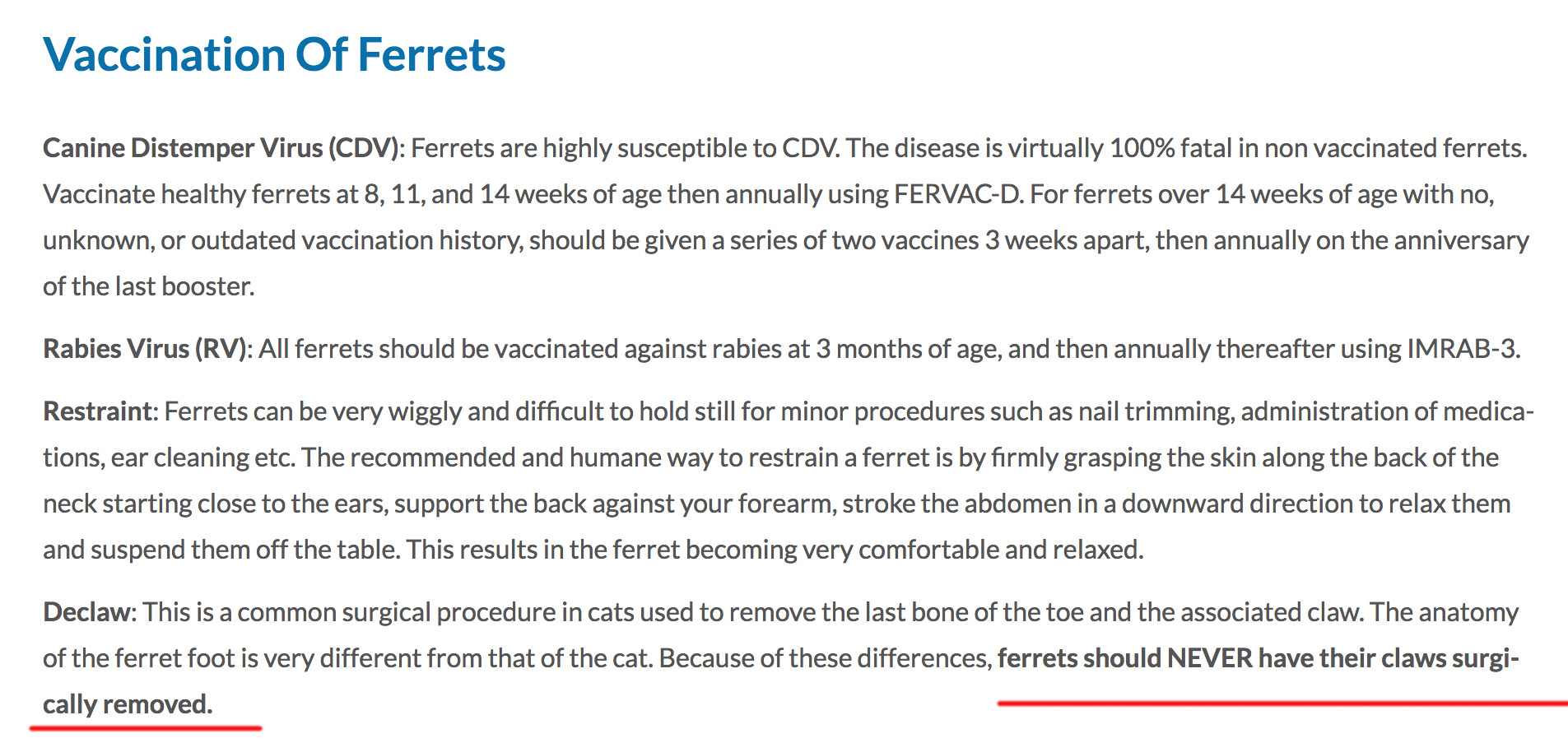
Here is a screenshot from Safarivet.com that talks about surgery for exotics.
Here’s a page saying that Safari Animal Care Center is a Fear Free Practice. (This Practice is NOT an officical Fear Free Certified veterinary practice) https://fearfreepets.com/
PLEASE REMEMBER TO ALWAYS BE RESPECTFUL AND TAKE THE HIGH ROAD WITH YOUR COMMENTS. WE MUST EDUCATE THE PUBLIC ABOUT THE FACTS ABOUT DECLAWING A CAT, A DOG, A RACCOON, A KINKAJOU, OR ANY ANIMAL. WE MUST EDUCATE THE PUBLIC ABOUT THE EASY, HUMANE OPTIONS LIKE NAIL TRIMS, COMMONSENSE, STURDY SCRATCHERS, DETERRENTS, ETC.
WHEN YOU ARE DISRESPECTFUL, MEAN, OR THREATENING, IT HURTS THE CA– USE, IT’S WRONG, AND IT HURTS ME BECA– USE THEY WILL BLAME YOUR MEAN COMMENTS ON ME.

